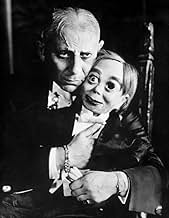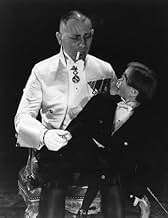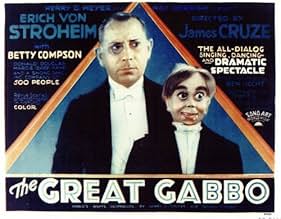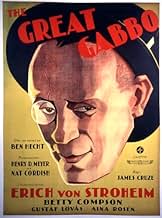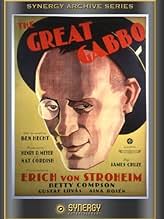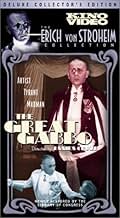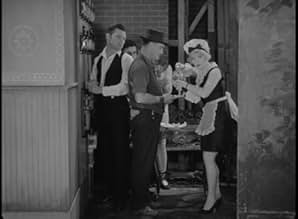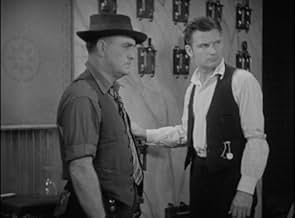IMDb RATING
6.0/10
1.1K
YOUR RATING
An insanely, egocentric ventriloquist, even though he is possessed by his wooden dummy, is in love with a dancer who is in love with another. The dummy gives advice to the ventriloquist.An insanely, egocentric ventriloquist, even though he is possessed by his wooden dummy, is in love with a dancer who is in love with another. The dummy gives advice to the ventriloquist.An insanely, egocentric ventriloquist, even though he is possessed by his wooden dummy, is in love with a dancer who is in love with another. The dummy gives advice to the ventriloquist.
Erich von Stroheim
- The Great Gabbo
- (as Eric Von Stroheim)
Marjorie Kane
- Babe
- (as Margie 'Babe' Kane)
George Grandee
- Otto
- (voice)
- (uncredited)
Bo Peep Karlin
- Dancer
- (uncredited)
Rosina Lawrence
- Dancer
- (uncredited)
Harry Ross
- Performer
- (uncredited)
Eddy Waller
- Vaudevillian
- (uncredited)
Marbeth Wright
- Dancer
- (uncredited)
- Director
- Writers
- All cast & crew
- Production, box office & more at IMDbPro
Featured reviews
Bizarre in the extreme but a highly entertaining film about a mad ventriloquist and the woman who loves him.
Erich von Stroheim makes his talkie debut as the spooky/mad ventriloquist who often speaks through his dummy (Otto) and eventually goes totally mad. Betty Compson plays his harried assistant who is finally driven away through his cruelty and madness. But they meet up again 2 years later when von Stroheim has become a star.
We get several scenes about the masochistic relationship between the stars played out against the background of a big New York revue. There are several terrific 20s songs in this film and one unforgettable production number with Compson and Donald Douglas as a fly and spider perched on a giant web.
The film also boasts the zippy Marjorie Kane who intros "That New Step." Von Stroheim is good and has a surprisingly light accent, but Compson steals the show as the pathetic assistant who can't understand him. She also gets to sing "I'm in Love with You" and adds one more talent to her resume of skills. Compson was also a concert violinist (see INSIDE THE LINES).
Compson and von Stroheim are excellent and the whole production becomes more and more surreal as it goes on. Certainly worth a look even if one number is missing (the "Ga Ga Bird") as are the Technicolor sequences. The whole film is black and white. The number "Every Now and Then" is tops.
Compson was one of the busiest actresses in Hollyword during the late 20s and early 30s.... she's a gem.
Erich von Stroheim makes his talkie debut as the spooky/mad ventriloquist who often speaks through his dummy (Otto) and eventually goes totally mad. Betty Compson plays his harried assistant who is finally driven away through his cruelty and madness. But they meet up again 2 years later when von Stroheim has become a star.
We get several scenes about the masochistic relationship between the stars played out against the background of a big New York revue. There are several terrific 20s songs in this film and one unforgettable production number with Compson and Donald Douglas as a fly and spider perched on a giant web.
The film also boasts the zippy Marjorie Kane who intros "That New Step." Von Stroheim is good and has a surprisingly light accent, but Compson steals the show as the pathetic assistant who can't understand him. She also gets to sing "I'm in Love with You" and adds one more talent to her resume of skills. Compson was also a concert violinist (see INSIDE THE LINES).
Compson and von Stroheim are excellent and the whole production becomes more and more surreal as it goes on. Certainly worth a look even if one number is missing (the "Ga Ga Bird") as are the Technicolor sequences. The whole film is black and white. The number "Every Now and Then" is tops.
Compson was one of the busiest actresses in Hollyword during the late 20s and early 30s.... she's a gem.
Once again I am dumbfounded at how a great movie can get such a low rating on IMDb. All I can guess is that most of the voters were expecting to see a Gene Kelly-type musical. If this describes you, then leave now. "The Great Gabbo" is about as ANTI-musical as a musical can get. It is a heavy, ponderous, gripping story with more drama than Francis Ford Coppola could ever eke out of a reel of film. It is a compelling and surprisingly complex journey into the mind of a bizarre man.
This is the story of a misunderstood artist whose canvas is a puppet. But whereas the stereotypical story of the misunderstood artist depicts the protagonist as a static character, Gabbo is a highly dynamic individual who keeps us guessing throughout. Is he a good man? Is he a bad man? Is he sane? Is he mad? These questions are not answered until the spectacular & powerful finale, and even then there is much room for speculation.
(As an aside to you Kurosawa fans, the structure of this film is much like Kurosawa's 1952 classic "Ikiru", at times slow but building up to a powerful and unforgettable finish. And the final image deserves its place in the Louvre.)
Regardless of if you're prepared for this type of experience, one thing is for sure: the amazing performance of Erich von Stroheim will burn itself into your mind forever. This film, being one of the early talkies, does not mix much dialogue and music. That is, the spoken scenes are done in silence with no music underneath (much like the 1931 Fritz Lang masterpiece "M"). This means that the actors must carry the entire scene on their shoulders, like in the old days of Shakespearian soliloquies. Erich von Stroheim rises to the challenge in this minimalist setting, and HE DELIVERS. In some scenes he makes you hate him. In others you love him. He can elicit pity as well as admiration. What a roller-coaster ride! Pitted against the heavy drama, the musical numbers seem jarring and incongruous at first. But on further reflection we realize that this emphasizes the bipolar, schizophrenic nature of the subject. Just like Gabbo, a man divided between two worlds, this film divides itself between Broadway musical and psychological thriller. This movie was at least 80 years ahead of its time, if not more.
That's all I'll say because the rest is best experienced as a surprise. This is the best film I've seen in a long time, and the only reason why I'm rating it an 8 instead of a 10 is that, sadly, the original colour scenes were lost, and some of the scenes are in need of restoration on my DVD copy. We can only dream of what it was like to see "The Great Gabbo" as it was originally shown in 1929.
This is the story of a misunderstood artist whose canvas is a puppet. But whereas the stereotypical story of the misunderstood artist depicts the protagonist as a static character, Gabbo is a highly dynamic individual who keeps us guessing throughout. Is he a good man? Is he a bad man? Is he sane? Is he mad? These questions are not answered until the spectacular & powerful finale, and even then there is much room for speculation.
(As an aside to you Kurosawa fans, the structure of this film is much like Kurosawa's 1952 classic "Ikiru", at times slow but building up to a powerful and unforgettable finish. And the final image deserves its place in the Louvre.)
Regardless of if you're prepared for this type of experience, one thing is for sure: the amazing performance of Erich von Stroheim will burn itself into your mind forever. This film, being one of the early talkies, does not mix much dialogue and music. That is, the spoken scenes are done in silence with no music underneath (much like the 1931 Fritz Lang masterpiece "M"). This means that the actors must carry the entire scene on their shoulders, like in the old days of Shakespearian soliloquies. Erich von Stroheim rises to the challenge in this minimalist setting, and HE DELIVERS. In some scenes he makes you hate him. In others you love him. He can elicit pity as well as admiration. What a roller-coaster ride! Pitted against the heavy drama, the musical numbers seem jarring and incongruous at first. But on further reflection we realize that this emphasizes the bipolar, schizophrenic nature of the subject. Just like Gabbo, a man divided between two worlds, this film divides itself between Broadway musical and psychological thriller. This movie was at least 80 years ahead of its time, if not more.
That's all I'll say because the rest is best experienced as a surprise. This is the best film I've seen in a long time, and the only reason why I'm rating it an 8 instead of a 10 is that, sadly, the original colour scenes were lost, and some of the scenes are in need of restoration on my DVD copy. We can only dream of what it was like to see "The Great Gabbo" as it was originally shown in 1929.
This is a strange little number because it's a pretty dark subject matter, which at times is pretty chilling to watch, but then they throw in lots of songs. I'm not too sure what the Directors were going for when they filmed this. I say this because it's evident, at times, that quite a few scenes were added later... and I cannot figure out why.
I really like the idea of the mad ventriloquist. In this stories concept, he is in love with his assistant, Mary (Compson), though finds it hard to fully converse with her. As The Great Gabbo (Erich von Stroheim), as he sees himself, he's nasty, offensive, and disagreeable. However, when he speaks through the dummy he can be loving and charming. It's this fissure that eventually leads to his mental breakdown.
I know that the musical moments are there because it's set in the vaudeville and theatre life, though for most of the time these feel more like padding - filling out time. I think this could be remade and be an actually powerful movie. Reduce the musical side and expand on the breakdown. There are times in this movie where chills ran down my spine. The part where Mary walks out on The Great Gabbo and the Dummy calls her softly back, to be reprimanded by Gabbo is both heartbreaking and creepy as hell.
The film, in general, is entertaining, though I have to say I found the number of musical intermissions too much. These are also 1920's musicals so are not so relevant today. Also, the dancing isn't up to par with bigger productions. Though I have to say the scene where Mary throws herself off a giant spiders web to be caught inches from the ground is breathtaking. I would say, for all creepy doll fans and those who like a psychological edge to their dramas, it's worth a watch.
I really like the idea of the mad ventriloquist. In this stories concept, he is in love with his assistant, Mary (Compson), though finds it hard to fully converse with her. As The Great Gabbo (Erich von Stroheim), as he sees himself, he's nasty, offensive, and disagreeable. However, when he speaks through the dummy he can be loving and charming. It's this fissure that eventually leads to his mental breakdown.
I know that the musical moments are there because it's set in the vaudeville and theatre life, though for most of the time these feel more like padding - filling out time. I think this could be remade and be an actually powerful movie. Reduce the musical side and expand on the breakdown. There are times in this movie where chills ran down my spine. The part where Mary walks out on The Great Gabbo and the Dummy calls her softly back, to be reprimanded by Gabbo is both heartbreaking and creepy as hell.
The film, in general, is entertaining, though I have to say I found the number of musical intermissions too much. These are also 1920's musicals so are not so relevant today. Also, the dancing isn't up to par with bigger productions. Though I have to say the scene where Mary throws herself off a giant spiders web to be caught inches from the ground is breathtaking. I would say, for all creepy doll fans and those who like a psychological edge to their dramas, it's worth a watch.
Though I agree with previous reviewers' comments about the good performances turned in by Erich Von Stroheim and Betty Compson, I thought the movie was disappointing overall. There isn't really much of a story, the dramatic scenes are often slow, and the rather bizarre musical numbers are poorly integrated into the plot. I'm not sure why this movie isn't classified as a musical, though; it has as many numbers as "42nd Street" and other similar titles from about the same period. Unfortunately, as a previous reviewer said, these scenes are not as creatively done as those by Busby Berkeley; the choreography is often unappealing, and the dancers don't look very well-rehearsed, though there are some bright spots.
Interestingly, the contemporary "Variety" review mentioned a color sequence in the film, which was not present on the Video Yesteryear VHS copy I watched. I wonder if this piece is lost, or available on other editions?
Interestingly, the contemporary "Variety" review mentioned a color sequence in the film, which was not present on the Video Yesteryear VHS copy I watched. I wonder if this piece is lost, or available on other editions?
Clunky solid gramophone sound and some sensational Ziegfeld stage numbers make this early talkie musical drama a real treat for viewers forgiving of 1929 movies. Vile schizophrenic ventriloquist brute, Von Stroheim, with his very creepy dummy (like the terrifying one in the DEAD OF NIGHT sequence with Michael Redgrave) seem somehow to be the toast of the stage. This 1929 showcase for both the technology of the day and the stage and screen stars rightly celebrated over the period are shown to be both fascinating and versatile as this film progresses. Other comments on this site will tell you the story and some criticize it's 1929 limits, but really THE GREAT GABBO is an excellent film of its day that rightly and clearly shows the force of Von Stroheim and the expert stage and screen dance entertainment popular in the 20s in the Ziegfeld sequences seemingly filmed right in front of a real stage. If you have seen THE BOYFRIEND the 1970 Ken Russell comedy you will get an idea of how fabulous THE GREAT GABBO must have looked in color. Most of the massive stage scenes are pale in my B/W copy and clearly are those sequences in Multicolour which the opening credits alert us to (be missing). Betty Boop sister Majorie Kane appears and most of the musical numbers are hilariously delightful, crowded with teens leaping about and bumping into each other in a great array of all sorts of fantasy costumes. The silliest and most enjoyable of which is a spider and fly number in which the above quote is hissed during a squabble in between verses. THE GREAT GABBO is a major find for students of 20s art deco, early talkie technology and very strong and effective acting. Von Stroheim must have been such a pain to Hollywood, a brute on screen and off. This film is full of wow! scenes. Highly recommended for anyone wanting further insight into the era. Other films worth seeing that add to the experience are GLORIFYING THE American GIRL, and THE 1929 SHOW OF SHOWS. The sound on my DVD copy is very good.
Did you know
- TriviaThe dummy Otto was a hand carved basswood Frank Marshall figure. The same man who designed Edgar Bergen's famous characters Charlie McCarthy and Mortimer Snerd.
- GoofsOverlooking the seeming impossibility of Gabbo having Otto the Dummy speak while Gabbo is eating, smoking, and drinking, Otto's head and mouth move with the words and music when Gabbo is at least six feet away.
- Alternate versionsGabbo le ventriloque (1929) was originally released by Sono Art-World Wide Pictures, with certain sequences were presented in Multicolor. However, current prints, restored by the Library of Congress and released by Kino International on DVD, exist only in black-and-white. Most, perhaps all, VHS and DVD releases of the film have the color sequences in black and white.
- ConnectionsEdited into The Girl from Calgary (1932)
- SoundtracksEvery Now and Then
(uncredited)
Written by King Zany and Donald McNamee
Performed by Marjorie Kane and Donald Douglas
Details
- Runtime1 hour 32 minutes
- Color
Contribute to this page
Suggest an edit or add missing content


